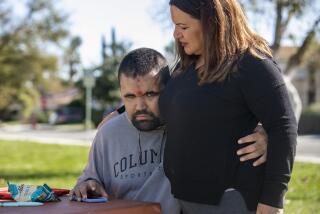Moving On : Doctors, Family Hope Paralyzed Boy Will Soon Leave Hospital for Home
- Share via
The joy of pleasant memories lit Linh Nguyen’s face when Liz Simpson, a nurse who has worked with him since he was paralyzed in a 1983 accident, asked, “What’s the best thing about going home?”
“Eating,” replied Linh, 7, with a smile, adding that he much prefers his mother’s cooking to the hospital fare, which doesn’t include Vietnamese food.
A recent overnight stay with his family in Orange was only Linh’s third visit home since he suffered a neck injury in a July 14, 1983, traffic accident. Although totally paralyzed from his neck down and dependent on a respirator to pump air in and out of his lungs, he has progressed to the point that his doctors and family hope he can soon move home permanently.
Hong Nguyen, Linh’s mother, said that during his most recent visit the whole family spent the night in the living room of their apartment to be near Linh, who could not be carried to an upstairs bedroom. He needs constant supervision because of his dependency on the respirator, and also must be turned every two hours to prevent bedsores.
“I’d like him to go home,” Nguyen said in an interview while visiting her son at Rancho Los Amigos Hospital in Downey. “He’d like to go home, rather than stay in the hospital. To go home to visit is good, but to go home and stay for good in the living room--I don’t think it’s good . . . . I’m worried. I don’t know, but we’ll try. I want him to go home. I’m still worried . . . .
“He doesn’t have anything to play at home. But he watches TV, and he watches his brothers play. If they play and laugh, he laughs. That makes him happy.”
Role of Elder Brother
Linh sometimes assumes the role of elder brother to his four younger brothers, Nguyen said. “If they (the younger boys) are fighting or something, he’ll say, ‘Don’t do that!’ ”
Hong Nguyen said that Linh was just 4 months old when she and her husband, Phuong Nguyen, fled Vietnam by boat with him in 1977 and sailed to Indonesia. Their other four children, all boys, were born in America, she said. Her husband worked as a roofer in Riverside, where they lived for four years, but was laid off and has been unable to find a job since they moved to Orange, she said. The family now lives on welfare, she said.
Linh speaks with some difficulty because he can talk only while the respirator is blowing air into his lungs, but he is capable of carrying on extended conversations. He also uses facial signals, such as raising his eyebrows to say “yes” and moving his eyes sideways to indicate “no.” He is fully bilingual in English and Vietnamese.
“Sometimes, he asks me why he doesn’t move, and other people move their hands and legs,” Nguyen said. “I explain for him sometimes . . . but I think he’s sad about it. He’s sad, but he doesn’t cry.”
One of Linh’s greatest pleasures is to play video games on a small computer equipped with special control buttons that quadriplegic patients can operate with their tongues.
Linh’s face showed excitement as he demonstrated his video-game skills for a visitor, pressing buttons to make a figure on the screen leap across canyons, avoid other obstacles or jump to the top of buildings.
Linh has also learned how to control a motorized wheelchair with a mouthpiece, enabling him to zip around hospital corridors under his own control.
A growing array of such devices, operable by mouth or tongue motion, is opening new vistas in the lives of paralyzed individuals, hospital staffers said.
“We think that (Linh) can have an excellent quality of life, and also a long life,” said Irene Gilgoff, Linh’s physician. When Linh grows up, Gilgoff said, “I’m sure he could manipulate a computer well enough to work for someone.”
Gilgoff cited the example of one of her former patients, also a quadriplegic dependent on a respirator, who runs a videotape business in Oregon.
“He’s got a very good mathematical mind,” she said. “He’s very good at using his staff, and he goes in and tells them what to do.”
Linh attends school on the hospital premises and should be able to enroll in a regular public school after moving back in with his family, according to Mike Bullock, a medical social worker at the hospital.
A van capable of handling Linh’s motorized wheelchair and attached respirator has been provided to his family by the Santa Ana office of the International Rescue Committee Inc. (IRC), enabling him to begin making more home visits. Once he is living permanently with his family, the van will be used to transport him to and from school.
“IRC bought the van, then we had to pay for repairs--and I don’t have (money) in my budget for that,” said Alicia Cooper, Orange County director of IRC, which originally sponsored Linh’s family into the United States. “But anyway, we did it. . . . When you know about a little boy in this condition, and you know there’s something really important, like a van, you just have to do it. That’s the way I felt.”
‘Robbing Too Many Peters’
But Cooper said that in spending $7,000 on the van, which is on loan to Linh’s family, she was “robbing too many Peters.”
“Somehow, we will get donations down the road that will help me get my budget back in balance,” she said. “IRC would really gratefully accept donations.”
Police reports and court documents show that Linh was struck by Angel Llamas Gallardo, 27, of Orange, after running out into the street between parked cars. Gallardo left the scene but returned about 20 minutes later, asked a policeman about the boy and admitted to being the driver who had hit him. Gallardo pleaded guilty to a hit-run charge and received a suspended 90-day jail sentence and three years’ probation.
But because Gallardo was uninsured, there has been no insurance money to provide a van or meet other needs arising from Linh’s injuries, Bullock said. Medi-Cal has paid the hospital bills, and Linh should be eligible for Medi-Cal funding of 16-hour-a-day care by professional nurses after he moves home, Bullock said. The family will be responsible for the remaining eight hours of daily supervision, he said.
More to Read
Sign up for Essential California
The most important California stories and recommendations in your inbox every morning.
You may occasionally receive promotional content from the Los Angeles Times.













